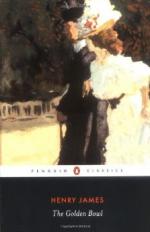There was no question for her, as she found, of closing her eyes and getting away; they strayed back to life, in the stillness, over the top of her Review; she could lend herself to none of those refinements of the higher criticism with which its pages bristled; she was there, where her companions were, there again and more than ever there; it was as if, of a sudden, they had been made, in their personal intensity and their rare complexity of relation, freshly importunate to her. It was the first evening there had been no one else. Mrs. Rance and the Lutches were due the next day; but meanwhile the facts of the situation were upright for her round the green cloth and the silver flambeaux; the fact of her father’s wife’s lover facing his mistress; the fact of her father sitting, all unsounded and unblinking, between them; the fact of Charlotte keeping it up, keeping up everything, across the table, with her husband beside her; the fact of Fanny Assingham, wonderful creature, placed opposite to the three and knowing more about each, probably, when one came to think, than either of them knew of either. Erect above all for her was the sharp-edged fact of the relation of the whole group, individually and collectively, to herself—herself so speciously eliminated for the hour, but presumably more present to the attention of each than the next card to be played.
Yes, under that imputation, to her sense, they sat—the imputation of wondering, beneath and behind all their apparently straight play, if she weren’t really watching them from her corner and consciously, as might be said, holding them in her hand. She was asking herself at last how they could bear it—for, though cards were as nought to her and she could follow no move, so that she was always, on such occasions, out of the party, they struck her as conforming alike, in the matter of gravity and propriety, to the stiff standard of the house. Her father, she knew, was a high adept, one of the greatest—she had been ever, in her stupidity, his small, his sole despair; Amerigo excelled easily, as he understood and practised every art that could beguile large leisure; Mrs. Assingham and Charlotte, moreover, were accounted as “good” as members of a sex incapable of the nobler consistency could be. Therefore, evidently, they were not, all so up to their usual form, merely passing it off, whether for her or for themselves; and the amount of enjoyed, or at least achieved, security represented by so complete a conquest of appearances was what acted on her nerves, precisely, with a kind of provocative force. She found herself, for five minutes, thrilling with the idea of the prodigious effect that, just as she sat there near them, she had at her command; with the sense that if she were but different—oh, ever so different!—all this high decorum would hang by a hair. There reigned for her, absolutely, during these vertiginous moments, that fascination of the monstrous, that temptation of the horribly possible, which we so often trace by its breaking out suddenly, lest it should go further, in unexplained retreats and reactions.




